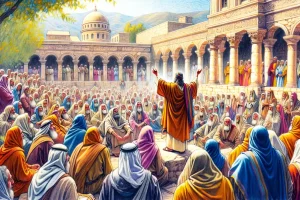
The Book of 1 Thessalonians
The Book of 1 Thessalonians opens with a heartfelt greeting from the Apostle Paul, Silvanus (Silas), and Timothy to the vibrant Christian community in Thessalonica, setting the tone for a letter filled with encouragement, exhortation, and hope in the midst of persecution. Here are some quick facts about the Book of 1 Thessalonians:
- Authorship: The letter is traditionally attributed to the Apostle Paul, along with Silvanus (Silas) and Timothy, likely written around 51-52 AD.
- Audience: Paul addresses the letter to the Christian community in Thessalonica, a city in Macedonia (modern-day Greece), which he had visited during his second missionary journey.
- Purpose: The primary purpose of 1 Thessalonians is to encourage and strengthen the Thessalonian believers in their faith amidst persecution and to address their questions about the return of Christ.
- Themes: Key themes include the endurance of faith in the face of persecution, the hope of Christ’s return, the importance of holy living, and the nature of Christian community.
- Structure: The letter can be divided into three main sections:
- Thanksgiving and reminiscences of the Thessalonians’ conversion (1:1–3:13)
- Instructions on holy living, including sexual purity, love for one another, and a strong work ethic (4:1–12)
- Teachings about Christ’s return and the resurrection of the dead, along with exhortations to be vigilant and prepared (4:13–5:28)
- Eschatology: 1 Thessalonians contains significant teachings about the return of Christ, including the hope of believers to be gathered with him and the timing of these events.
- Historical Context: Thessalonica was a vibrant city with a diverse population. Paul’s ministry there faced opposition from both Jews and Gentiles, resulting in persecution for the new Christian converts.
- Significance: 1 Thessalonians is one of the earliest extant Christian documents, providing valuable insights into the beliefs, practices, and challenges of early Christian communities. It also offers timeless wisdom and encouragement for believers facing similar trials today.
Here’s a detailed analysis of the Book of 1 Thessalonians:
- Authorship and Date:
- Historical Context:
- Thessalonica was a bustling city in Macedonia (modern-day Greece), with a diverse population.
- Paul’s missionary journey to Thessalonica faced opposition from both Jews and Gentiles, resulting in persecution for the newly formed Christian community.
- Purpose:
- To encourage and strengthen the Thessalonian believers in their faith amidst persecution (1 Thessalonians 3:2-4).
- To address questions and concerns about Christ’s return and the fate of deceased believers (1 Thessalonians 4:13-18).
- Themes:
- Faith and Endurance: Paul commends the Thessalonians for their steadfast faith in the face of persecution (1 Thessalonians 1:6-8) and encourages them to continue living holy lives (1 Thessalonians 4:1-8).
- Hope of Christ’s Return: A central theme of the letter is the return of Christ. Paul assures the Thessalonians that those who have died in Christ will rise first, and then those who are still alive will be caught up together with them to meet the Lord in the air (1 Thessalonians 4:13-18).
- Love and Community: Paul emphasizes the importance of brotherly love and living peacefully with one another (1 Thessalonians 4:9-12).
- Structure:
- Salutation and Thanksgiving (1:1-10): Paul expresses gratitude for the Thessalonians’ faith and recounts his ministry among them.
- Paul’s Concern for the Thessalonians (2:1-3:13): He defends his ministry and expresses his longing to see them again.
- Instructions on Holy Living (4:1-12): Paul encourages the Thessalonians to excel in holiness and love.
- The Lord’s Coming and the Resurrection (4:13-5:11): Paul addresses questions about the fate of deceased believers and provides reassurance regarding Christ’s return.
- Final Exhortations and Benediction (5:12-28): Paul offers various instructions for Christian living and concludes with a prayer for God’s grace.
- Eschatology:
- 1 Thessalonians contains significant teachings about the return of Christ, the resurrection of the dead, and the final judgment.
- It emphasizes the need for readiness and vigilance in anticipation of Christ’s coming.
- Significance:
- 1 Thessalonians provides valuable insights into the beliefs, practices, and challenges of early Christian communities.
- It offers timeless wisdom and encouragement for believers facing persecution and uncertainty, emphasizing the hope found in Christ’s return and the importance of living holy and loving lives.
In summary, the Book of 1 Thessalonians is a foundational text in the New Testament that addresses practical concerns of early Christians while offering profound theological insights into the hope of Christ’s return and the imperative of holy living amidst adversity.



